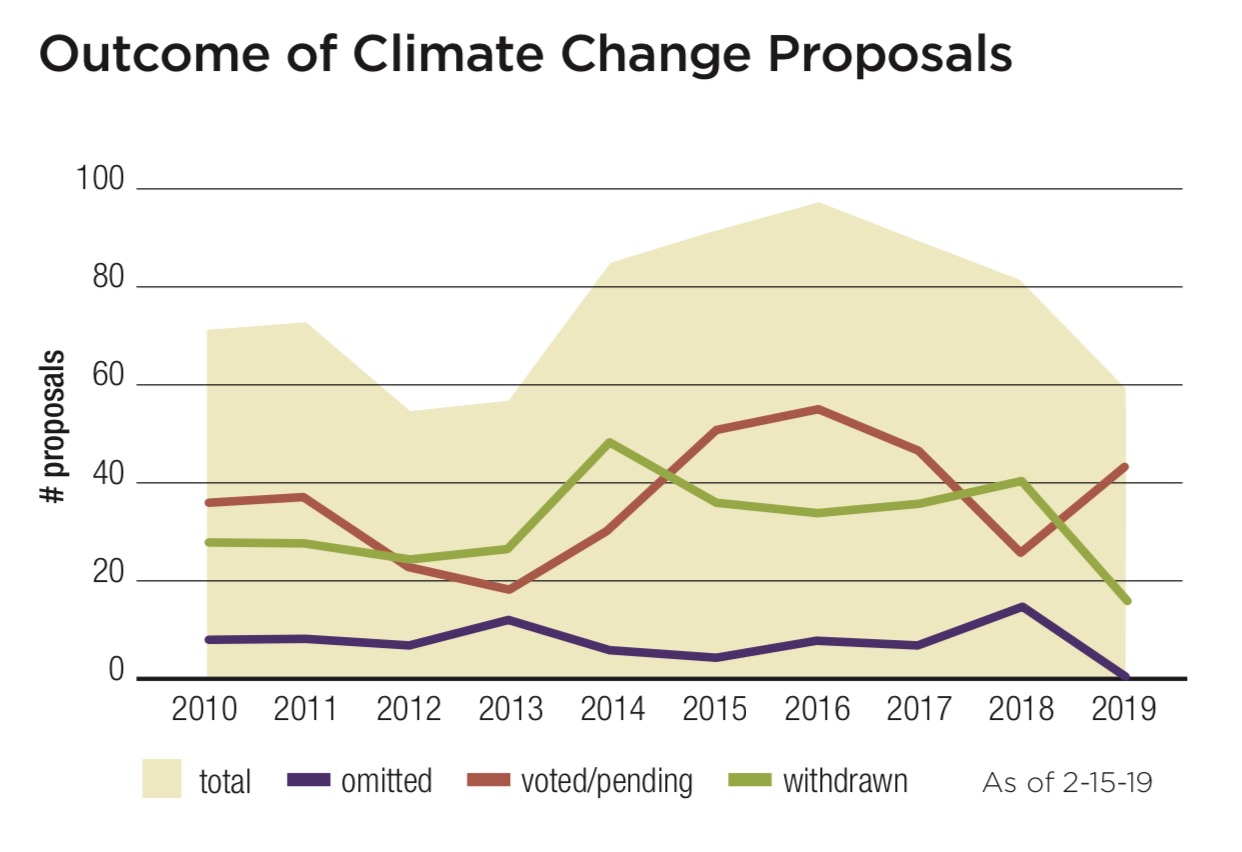As average global temperatures continue to rise and the disasterous effects threaten major population centers and significant geographical regions, investors are continuing their efforts to enlist companies in the fight to lessen the worst effects. In the United States, political barriers to climate action continue to abound. President Trump not only denies climate science, but also has openly mocked those who take it seriously. Republicans controlled Congress for the first half of Trump’s administration and have largely conformed to Trump’s agenda, but the new Democratic majority in the House of Representatives plans to press for stronger climate action. On the GOP side, a growing conservative coalition is promoting a carbon tax, opening the possibility that a bipartisan deal is possible. Recent “Green New Deal” proposals from Democratics seems likely to feature high in the 2020 presidential election, even though meaningful climate change legislation still seems uncertain and may arrive too late to force the emissions reductions we must achieve to avoid severe impacts on the economy and society at large. This reality underscores investors’ urgency in pressing companies to act, and it explains why large, usually cautious mutual funds continue to press for disclosure and action to mitigate climate risks from companies they own.
Shareholder proposals remain evenly divided between those focused on carbon asset risk and those seeking information about greenhouse gas (GHG) emissions management, as in 2018. Proponents remain keenly interested in how companies are assessing carbon asset risks and still want to see more oversight, management and disclosure of strategy—with 20 resolutions about this (down from 27 at this point last year). Investors have seen significant progress in persuading companies to report—with tailwinds coming from majority votes during the last two proxy seasons at leading energy firms. But proponents also have filed 23 proposals about GHG management, seeking goals or reports on such goals. Nine resolutions ask about renewable energy use and goals, down from 15 last year. After 11 proposals last year on unconventional fossil fuel energy production and its associated methane releases, there are just three this year. Four also address deforestation, with a final new proposal about access to sustainable energy. (Pie chart.)
SOCIAL COST AND MATERIAL LOSS: THE DAKOTA ACCESS PIPELINE
Carla Fredricks
Director, First Peoples Investment Engagement Program, University of Colorado
For 25 years shareholders have been raising concerns over corporate infringement on Indigenous Peoples’ Rights. Indigenous Peoples have helped to raise international awareness about how pipelines such as the Dakota Access, Keystone, and Trans Mountain projects harm local communities. Companies often minimize the social cost of public protests, even as investors contend that grassroots opposition can impose significant financial and brand risks.
The Ceres coalition coordinates nearly all these proposals, working with its Investor Network on Climate Risk (INCR) and a broad coalition of institutional investors, including many members of the Interfaith Center on Corporate Responsibility (ICCR) and some individuals. Investors around the globe are focusing their efforts on key carbon emitters that account for two-thirds of global industrial emissions, through the new initiative Climate Action 100+, with backing from 310 institutions that have $32 trillion in assets under management. Undergirding many of the resolutions, and the strategic concern of long-term investors, is the sense that regulatory regimes ultimately will favor lower-carbon fuel sources and leave stranded carbon assets that account for a large part of the market value claimed on the balance sheets of energy companies. Proponents also contend that utilities dependent in large part on fossil-fuel powered electricity will be caught short if they do not aggressively manage a transition to lower carbon-intensive power generation. The January bankruptcy of Pacific Gas & Electric, on the hook for damages from the California wildfires, is being called one of the first climate-related casualties—underscoring these concerns and showing how much investors can lose when claimants line up in court. The company faces $30 billion in liabilities, exceeding its assets.
(Sections below on Environmental Management and Sustainable Governance cover environmental and social topics that also raise climate change issues.)




